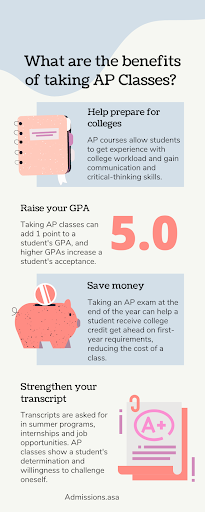Education question: AP classes motivate, discourage
May 7, 2022
Pro: AP classes offer multiple benefits for eager students
From acquiring college credits to impressing college admission officers, advanced placement (AP) classes offer great opportunities for students to build upon their academic skills. According to TeenLife, AP classes hold numerous benefits, such as saving money on tuition, increasing one’s chances for merit aid and even graduating early from college.
One source of motivation to take AP classes includes a one point increase in the grade point average (GPA) boost to a student’s weighted GPA. According to Crismon Education, several competitive colleges look for a weighted GPA of 4.2, which can be unattainable without taking honors classes that add 0.5 to a student’s GPA, and participation in AP courses, adding 1 point to the GPA.
Popular AP classes that students take are AP English Language and Composition, AP U.S. History, AP English Literature and AP World History. These classes develop comprehensive skills that can be applied to a broad range of classes.
Such classes help students accurately articulate arguments and create powerful essays. By learning such skills, students are prepared for colleges where they may write over 15 essays per semester, according to How To Learn.
Many students that take AP classes often take the corresponding exam in May or June, which tests material students have been taught throughout the year. These exams may allow students to get college credit, as earning a score of 4 or above allows a student not to retake the class in most colleges.The willingness to take a rigorous AP course and the corresponding test at the end of the year also signifies a strong applicant and increases their chances of admission.
College credits earned through AP exam scores can add up, possibly allowing one to finish college early. In other words, students can complete a solid portion of their general education requirements before entering college. Resources to learn more about AP classes and their potential college credits include AP College Board and Prep Scholar.
AP classes allow one to investigate college-level topics that they would be interested in pursuing and receive an upper-hand when navigating post-high school education. Furthermore, the completion of AP’s can be shown as a strength when applying for summer programs or leadership opportunities.

Shreeja Tangutur is a senior and this is her third year on The Purple Tide. This year, she will be the Unity and Social Media Director for the publication....
Con: AP classes diminish students’ love of learning
The words “AP exams” ring throughout the school as teachers wrap up their final lessons and prepare their students for upcoming exams in May.
According to College Vine, advanced placement (AP) classes provide a semester’s worth of college-level curriculum, which includes subjects like foreign languages, sciences, math, social sciences and computer science. Students have the option to take their exam in May to potentially earn college credit depending on what their colleges accept. CHS offers 33 AP classes. While these courses challenge students with their abilities to handle rigorous content, they also create repercussions on students’ learning.
Taking these challenging classes can show colleges that students are ready to tackle tough curriculums at the post-secondary level. However, the decision that many students continue to make is that they lose their love of learning, according to research by The City of New York University.
Some students don’t take these AP classes because they necessarily like the subject, but rather to satisfy the unspoken requirements of taking a high number of AP classes. These classes have turned into a competition, where people just check it off their list to show their “superiority” when its true purpose should be to allow students to explore the subject in a meaningful way because they truly enjoy learning about it. While it is important to demonstrate to colleges that one is hardworking, students should also prioritize the type of AP classes they are taking and see if it fits within their interests and schedule.
Furthermore, according to Psychology Today, AP courses don’t teach critical thinking skills or allow students to be deeply involved with the information because of their emphasis on covering a large scope of the content. AP classes have drifted away from allowing students to learn interesting subjects and instead have become a race of memorization and practice for an exam.
Additionally, AP classes take a toll on students’ mental health. Research by Psychology Today finds that there were high rates of anxiety, depression and suicide in high-achieving schools that place an emphasis on AP classes. The stress of taking many APs and performing well in these demanding classes have increased distress and tension in students who are attempting to bite off more than they can chew. Students are piling on numerous AP classes, resulting in skyrocketing burnout rates and affecting their social and emotional wellbeing.
A major misconception is that if a student takes AP courses in high school, they do well in college and if they don’t, then they won’t do well. According to research done by Challenge Success, while those who have taken AP classes in high school do well in college and those who do not take that many, or even none, still do well in college.
Although AP classes have their benefits, such as providing opportunities for students to prepare for college classes and potentially giving them college credit, one must look into the drawbacks of the AP course they plan to take and understand whether these courses will truly help them achieve their academic and personal goals or rather, hinder them and diminish their wellbeing.

Nithya is a junior and this is her second year on the Purple Tide. She is heavily involved in Debate, Red Cross and the Writing Center. Outside of school,...

